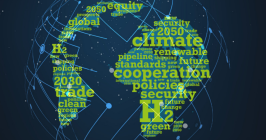
-
-
IRENA (2022), Geopolitics of the Energy Transformation: The Hydrogen Factor, International Renewable Energy Agency, Abu Dhabi.
Copied
/-/media/Files/IRENA/Agency/Publication/2022/Jan/IRENA_Geopolitics_Hydrogen_2022.pdf
Copied
Geopolitics of the Energy Transformation: The Hydrogen Factor
Newsletter
Download Slides
The report is also available in Arabic (عربي), Chinese (中文), French (français), Russian (русский) and Spanish (español).
As countries around the world rally behind net zero targets, hydrogen is increasingly seen as a missing piece of the energy transformation puzzle to decarbonise harder-to-abate sectors. The possible pathway on which hydrogen might evolve still involves many uncertainties. With the growing momentum to establish a global hydrogen market comes the need for a deeper understanding of its broader effects, including geopolitical aspects. IRENA has carried out an in-depth analysis of the geopolitics of hydrogen as part of the work of the Collaborative Framework on the Geopolitics of Energy Transformation (CF-GET). The report builds on IRENA’s substantial body of work in hydrogen and benefits from a wide range of expert input in the fields of energy and geopolitics.
This report considers whether and how hydrogen may disrupt future energy systems, reflecting on many of the key themes discussed in the Global Commission’s report, A New World – The Geopolitics of the Energy Transformation. The analysis offers insights into how countries and stakeholders can navigate the uncertainties and shape the development of hydrogen markets, and outlines policy considerations to help mitigate the geopolitical risks and capitalise on opportunities. Some of the key findings of the report include:
- Hydrogen is part of a much bigger energy transition picture, and its development and deployment strategies should not be considered in isolation.
- Setting the right priorities for hydrogen use will be essential for its rapid scale-up and long-term contribution to decarbonisation efforts.
- The 2020s could become the era of a big race for technology leadership, as costs are likely to fall sharply with learning and scaling-up of needed infrastructure. Equipment manufacturing offers an opportunity to capture value in the coming years and decades.
- Hydrogen trade and investment flows will spawn new patterns of interdependence and bring shifts in bilateral relations.
- Countries with an abundance of low-cost renewable power could become producers of green hydrogen, with commensurate geoeconomic and geopolitical consequences.
- Hydrogen could be an attractive avenue for fossil fuel exporters to help diversify their economies and develop new export industries.
- Supporting the advancement of renewable energy and green hydrogen in developing countries is critical for decarbonising the energy system and can contribute to global equity and stability.
- International co-operation will be necessary to devise a transparent hydrogen market with coherent standards and norms that contribute to climate change efforts meaningfully.
The Annex containing the summary of the results of the geopolitics of hydrogen surveys of experts and IRENA member states is available to download here.





